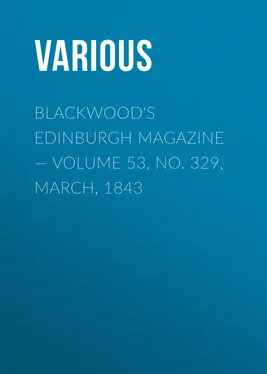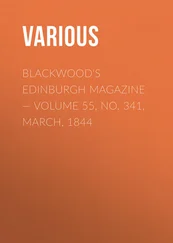Various - Blackwood's Edinburgh Magazine — Volume 53, No. 329, March, 1843
Здесь есть возможность читать онлайн «Various - Blackwood's Edinburgh Magazine — Volume 53, No. 329, March, 1843» — ознакомительный отрывок электронной книги совершенно бесплатно, а после прочтения отрывка купить полную версию. В некоторых случаях можно слушать аудио, скачать через торрент в формате fb2 и присутствует краткое содержание. Издательство: Иностранный паблик, Жанр: foreign_antique, periodic, foreign_edu, на английском языке. Описание произведения, (предисловие) а так же отзывы посетителей доступны на портале библиотеки ЛибКат.
- Название:Blackwood's Edinburgh Magazine — Volume 53, No. 329, March, 1843
- Автор:
- Издательство:Иностранный паблик
- Жанр:
- Год:неизвестен
- ISBN:нет данных
- Рейтинг книги:3 / 5. Голосов: 1
-
Избранное:Добавить в избранное
- Отзывы:
-
Ваша оценка:
- 60
- 1
- 2
- 3
- 4
- 5
Blackwood's Edinburgh Magazine — Volume 53, No. 329, March, 1843: краткое содержание, описание и аннотация
Предлагаем к чтению аннотацию, описание, краткое содержание или предисловие (зависит от того, что написал сам автор книги «Blackwood's Edinburgh Magazine — Volume 53, No. 329, March, 1843»). Если вы не нашли необходимую информацию о книге — напишите в комментариях, мы постараемся отыскать её.
Blackwood's Edinburgh Magazine — Volume 53, No. 329, March, 1843 — читать онлайн ознакомительный отрывок
Ниже представлен текст книги, разбитый по страницам. Система сохранения места последней прочитанной страницы, позволяет с удобством читать онлайн бесплатно книгу «Blackwood's Edinburgh Magazine — Volume 53, No. 329, March, 1843», без необходимости каждый раз заново искать на чём Вы остановились. Поставьте закладку, и сможете в любой момент перейти на страницу, на которой закончили чтение.
Интервал:
Закладка:
This opinion, bold and perhaps rash as it may appear to Russians, seems to derive some support, as well as illustration, from the immense number of foreign words which make the Russian of Peter's time
"A Babylonish dialect;"
the mania for every thing foreign having overwhelmed the language with an infinity of terms rudely torn, not skilfully adapted, from every tongue; terms which might have been—have, indeed, since been—translated into words of Russian form and origin. A review of the literary progress made at this time will, we think, go far to establish our proposition; it will exhibit a very large proportion of translations, but very few original productions.
From this period begins the more immediate object of the present note: we shall briefly trace the rise and fortunes of the present, or vernacular Russian literature; confining our attention, as we have proposed, to the Prose Fiction, and contenting ourselves with noting, cursorily, the principal authors in this kind, living and dead.
At the time of Peter the Great, there may be said to have existed (it will be convenient to keep in mind) three languages—the Slavonic, to which we have already alluded; the Russian; and the dialect of Little Russia.
The fact, that the learned are not yet agreed upon the exact epoch from which to date the origin of the modern Russian literature, will probably raise a smile on the reader's lip; but the difficulty of establishing this important starting-point will become apparent when he reflects upon the circumstance, that the literature is—as we have stated—divisible into two distinct and widely differing regions. It will be sufficiently accurate to date the origin of the modern Russian literature at about a century back from the present time; and to consider Lomonósoff as its founder. Mikháil Vassílievitch Lomonósoff, born in 1711, is the author who may with justice be regarded as the Chaucer or the Boccacio of the North: a man of immense and varied accomplishments, distinguished in almost every department of literature, and in many of the walks of science. An orator and a poet, he adorned the language whose principles he had fixed as a grammarian.
He was the first to write in the spoken language of his country, and, in conjunction with his two contemporaries, Soumarókoff and Kheráskoff, he laid the foundations of the Russian literature.
Of the other two names we have mentioned as entitled to share the reverence due from every Russian to the fathers of his country's letters, it will be sufficient to remark, that Soumarókoff was the first to introduce tragedy and opera, and Kheráskoff, the author of two epic poems which we omit to particularize, as not coming within our present scope, wrote a work entitled "Cadmus and Harmonia," which may be considered as the first romance. It is a narrative and metaphysical work, which we should class as a "prose poem;" the style being considerably elevated above the tone of the "Musa pedestris."
The name of Emín comes next in historical, though not literary, importance: though the greater part of his productions consists of translations, particularly of those shorter pieces of prose fiction called by the Italians "novelle," he was the author of a few original pieces, now but little read; his style bears the marks, like that of Kheráskoff, of heaviness, stiffness, and want of finish.
The reputation of Karamzín is too widely spread throughout Europe to render necessary more than a passing remark as to the additions made by him to the literature of his country in the department of fiction: he commenced a romance, of which he only lived to finish a few of the first chapters.
Naréjniy was the first to paint the real life of Russia—or rather of the South or Little Russia: in his works there is a good deal of vivacity, but as they are deformed by defects both in style and taste, his reputation has become almost extinct. We cannot quit this division of our subject, which refers to romantic fiction anterior to the appearance of the regular historical novel, without mentioning the names of two, among a considerable number of authors, distinguished as having produced short narratives or tales, embodying some historical event—Polevói and Bestónjeff—the latter of whom wrote, under the name of Marlínski, a very large number of tales, which have acquired a high and deserved reputation.
It is with Zagóskin that we may regard the regular historical novel—viewing that species of composition as exemplified in the works of Scott—as having commenced.
With reference to the present state of romance in Russia, the field is so extensive as to render impossible, in this place, more than a cursory allusion to the principal authors and their best-known works: in doing which, we shall attend more exclusively to those productions of which the subject or treatment is purely national.
One of the most popular and prolific writers of fiction is Zagóskin, whose historical romance "Yoúriy Milosláffskiy," met with great and permanent success. The epoch of this story is in 1612, a most interesting crisis in the Russian history, when the valour of Mínin enabled his countrymen to shake off the hated yoke of Poland. His other work, "Roslavleóff," is less interesting: the period is 1812. We may also mention his "Iskonsítel"—"the Tempter"—a fantastic story, in which an imaginary being is represented as mingling with and influencing the affairs of real life.
Of Boulgárin, we may mention, besides his "Ivan Vuíjgin," a romance in the manner of "Gil Blas," the scenery and characters of which are entirely Russian, two historical novels of considerable importance. "The False Dimítri," and "Mazeppa,"—the hero of the latter being a real person , and not, as most readers are aware, a fictitious character invented by Byron.
Next comes the name of Lajétchnikoff, whose "Last Page" possesses a reputation, we believe, tolerably extensive throughout Europe. The action passes during the war between Charles XII. and Peter the Great, and Catharine plays a chief part in it, as servant of the pastor Glück, becoming empress at the conclusion. The "House of Ice," by the same writer, is perhaps more generally known than the preceding work. The last-named romance depicts with great spirit the struggle between the Russian and foreign parties in the reign of Anna Ivánovna. But perhaps the most remarkable work of Lajétchnikoff is the romance entitled "Bassourmán," the scene of which is laid under Iván III., surnamed the Great. 9 9 The non-Russian reader must be cautioned not to confuse Iván III. (surnamed Velíkiy, or the Great) with Ivan IV., the Cruel, the latter of whom is to foreigners the most prominent figure in the Russian history. Iván III. mounted the throne in 1462, and his terrible namesake in 1534; the reign of Vassíliy Ivánovitch intervening between these two memorable epochs.
Another Polevói (Nikolái) produced a work of great merit:—"The Oath at the Tomb of Our Lord," a very faithful picture of the first half of the fifteenth century, and singular from the circumstance that love plays no part in the drama. Besides this, we owe to Polevói a wild story entitled "Abbaddon." Veltman produced, under the title of "Kostshéi the Deathless," a historical study of the manners of the twelfth century, possessing considerable merit. It would be unjust to omit the name of a lady, the Countess Shíshkin, who produced the historical novel "Mikháil Vassílievitch Skópin-Shúisky," which obtained great popularity.
The picturesque career of Lomonósoff gave materials for a romantic biography of that poet, the work of Xenophónt Polevói, resembling, in its mixture of truth and fiction, the "Wahrheit und Dichtung" of Goethe.
Among the considerable number of romances already mentioned, those exhibiting scenes of private life and domestic interest have not been neglected. Kaláshnikoff wrote "The Merchant Jáloboff's Daughter," and the "Kamtchadálka," both describing the scenery and manners of Siberia; the former painting various parts of that wild and interesting country, the latter confined more particularly to the Peninsula of Kamtchátka. Besides Gógol, whose easy and prolific pen has presented us with so many humorous sketches of provincial life, we cannot pass over Begitchéff, whose "Khólmsky Family" possesses much interest; but the delineations of Gógol depend so much for their effect upon delicate shades of manner, &c., that it is not probable they can ever be effectively reproduced in another language.
Читать дальшеИнтервал:
Закладка:
Похожие книги на «Blackwood's Edinburgh Magazine — Volume 53, No. 329, March, 1843»
Представляем Вашему вниманию похожие книги на «Blackwood's Edinburgh Magazine — Volume 53, No. 329, March, 1843» списком для выбора. Мы отобрали схожую по названию и смыслу литературу в надежде предоставить читателям больше вариантов отыскать новые, интересные, ещё непрочитанные произведения.
Обсуждение, отзывы о книге «Blackwood's Edinburgh Magazine — Volume 53, No. 329, March, 1843» и просто собственные мнения читателей. Оставьте ваши комментарии, напишите, что Вы думаете о произведении, его смысле или главных героях. Укажите что конкретно понравилось, а что нет, и почему Вы так считаете.












